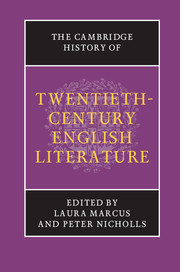Book contents
- Frontmatter
- Introduction
- PART ONE WRITING MODERNITY
- PART TWO THE EMERGING AVANT-GARDE
- PART THREE MODERNISM AND ITS AFTERMATH, 1918–1945
- PART FOUR POST-WAR CULTURES, 1945–1970
- PART FIVE TOWARDS THE MILLENNIUM, 1970–2000
- 32 The Seventies and the cult of culture
- 33 Feminism and writing: the politics of culture
- 34 The half-lives of literary fictions: genre fictions in the late twentieth century
- 35 Theatre and politics
- 36 Irish literature: tradition and modernity
- 37 Scottish literature: Second Renaissance
- 38 Towards devolution: new Welsh writing
- 39 British–Jewish Writing and the turn towards diaspora
- 40 Fiction and postmodernity
- 41 Postcolonial fictions
- 42 Writing lives
- 43 Poetry after 1970
- 44 Ending the century: literature and digital technology
- Bibliography
- Index
- References
36 - Irish literature: tradition and modernity
from PART FIVE - TOWARDS THE MILLENNIUM, 1970–2000
Published online by Cambridge University Press: 28 March 2008
- Frontmatter
- Introduction
- PART ONE WRITING MODERNITY
- PART TWO THE EMERGING AVANT-GARDE
- PART THREE MODERNISM AND ITS AFTERMATH, 1918–1945
- PART FOUR POST-WAR CULTURES, 1945–1970
- PART FIVE TOWARDS THE MILLENNIUM, 1970–2000
- 32 The Seventies and the cult of culture
- 33 Feminism and writing: the politics of culture
- 34 The half-lives of literary fictions: genre fictions in the late twentieth century
- 35 Theatre and politics
- 36 Irish literature: tradition and modernity
- 37 Scottish literature: Second Renaissance
- 38 Towards devolution: new Welsh writing
- 39 British–Jewish Writing and the turn towards diaspora
- 40 Fiction and postmodernity
- 41 Postcolonial fictions
- 42 Writing lives
- 43 Poetry after 1970
- 44 Ending the century: literature and digital technology
- Bibliography
- Index
- References
Summary
Lamenting the erosion of traditional values, a disillusioned Irish politician is reputed to have complained that there was no sex in Ireland before television. The national television service was inaugurated in 1962. So, assuming that Philip Larkin was right in dating the beginning of sexual intercourse to 1963, sex came to Ireland a full year before it reached the United Kingdom. Sex was only one of the foreign arrivals that came to Ireland during the sixties. Under the expansionist polices of Taoiseach Sean Lemass and his economic adviser T. K. Whitaker, the protectionist strategies of the de Valera era were reversed and an open economy fuelled by international markets and foreign investment was nurtured. The resulting economic growth checked the emigration and unemployment of the forties and fifties, while the cities and towns of Ireland burgeoned around the new factories. Outside Belfast, Ireland had never really had an industrial revolution and the overwhelmingly rural nature of Irish life, when enlisted by nationalist ideology, often emerged as a pastoral ideal, with images of mystic landscapes and cosy homesteads. In literary terms, however, from Patrick Kavanagh’s The Great Hunger (1942) to (perhaps belatedly) Martin McDonagh’s The Leenane Trilogy (1995–7), it became a very familiar manoeuvre to debunk this ideal, and to depict repressive, materially impoverished communities, starved of meaningful spiritual and emotional sustenance. In 1971, though, for the first time in its history, more Irish people were living in towns than in the countryside.
- Type
- Chapter
- Information
- The Cambridge History of Twentieth-Century English Literature , pp. 653 - 667Publisher: Cambridge University PressPrint publication year: 2005



